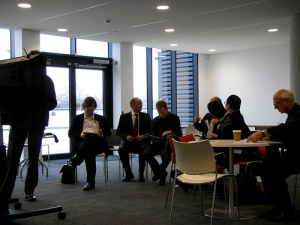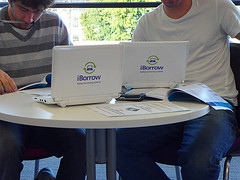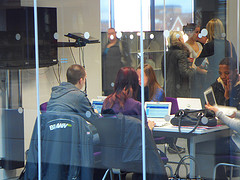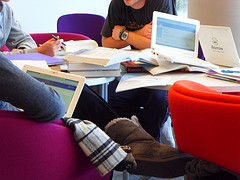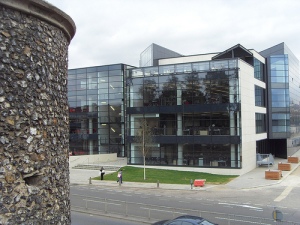Press release – Canterbury Christ Church University wins Award for Excellence
The annual UCISA Higher Education Award for Excellence, sponsored by Eduserv, has been won this year by Canterbury Christ Church University. The Award seeks to recognise and highlight levels of excellence and best practice that currently exist and are demonstrated by UCISA members within the UK higher and further education sectors.
Canterbury Christ Church’s submission focused on the development of the iBorrow scheme. The aim of the project was to introduce a self service laptop loan scheme to a new £35M library and student services centre. Once the loan service had been introduced, the project looked to collect a range of empirical data using wireless technology to determine how students were engaging with different learning spaces and technology. The data will then be used to inform future learning space design and developments.
On hearing of the University’s success, Dr Keith Gwilym, Pro-Vice Chancellor (Learning & Quality) commented:
“Canterbury Christ Church University is delighted to have won this year’s UCISA Award for Excellence. The iBorrow project has been a great success for the University and winning this award is a reflection of the innovation and hard work put in by the project team.“
Christine Sexton, Chair of UCISA, who also chaired the judging panel, added:
“the project clearly meets a business need by providing access to laptop technology to a university population where laptop ownership is not common.”
Stephen Butcher, Chief Executive of sponsors Eduserv, commented:
“the consideration of staff time as an important cost to be addressed helped make the case for a project that is already realising benefits.”
The entry from Queen Margaret University, which focused on the implementation of a fully integrated student, visitor and staff smartcard for use across the institution, was highly commended.
Christine Sexton concluded:
“The Award once again attracted high quality submissions in a variety of areas which highlights the top quality innovative work that our members undertake in their institutions”.
Notes
UCISA, the Universities and Colleges Information Systems Association, is the key membership organisation representing those responsible for delivering information systems and technology services in universities, colleges and related institutions. One of UCISA’s fundamental aims is to identify and disseminate best practice in the promotion and use of information systems, services and technologies in UK Higher and Further Education. The awards given by UCISA represent one strand of this activity.
Visit www.ucisa.ac.uk or contact Anna Mathews, Assistant Executive Secretary, UCISA, University of Oxford, 13 Banbury Road, Oxford, OX2 6NN, tel. 01865 283425, email execsec@ucisa.ac.uk
Eduserv is dedicated to developing and delivering technology services for education and the public sector. As a not-for-profit organisation and registered charity, we fulfil our mission by providing services for the public benefit.
Visit www.eduserv.org.uk or contact Andrew Tavener at Eduserv, Royal Mead, Railway Place, Bath, BA1 1SR, tel: 01225 474300, email: andrew.tavener@eduserv.org.uk
For information about Canterbury Christ Church University, see http://www.canterbury.ac.uk or contact Lucy Marsden, Corporate Communications Assistant, Department of Marketing, Canterbury Christ Church University, Rochester House, St. Georges Place, Canterbury, CT1 1UT, tel: 01227 782826, email: lucy.marsden@canterbury.ac.uk
